Leadership and Ethical Analysis of Mark Zuckerberg (University)
VerifiedAdded on 2022/10/11
|6
|1419
|6
Report
AI Summary
This research paper delves into the leadership and ethical dimensions of Mark Zuckerberg, the founder of Facebook, based on David Kirkpatrick's article "The Temptation of Facebook." The study examines Zuckerberg's decision-making process, particularly his choice to reject a lucrative offer from Viacom, and analyzes the ethical implications of his actions. It explores his leadership qualities, such as equanimity and critical thinking, highlighting how these traits shaped Facebook's trajectory. The paper also considers the deontological and teleological approaches to business ethics exemplified by Zuckerberg's focus on long-term vision over short-term gains. Through a critical analysis and the incorporation of scholarly articles, the research underscores the impact of Zuckerberg's leadership and ethical considerations on the success and evolution of Facebook, providing a comprehensive understanding of his decision-making style and its implications for the company's growth and impact on the world. The paper provides a critical analysis and provides insights into Zuckerberg's leadership and ethical framework.
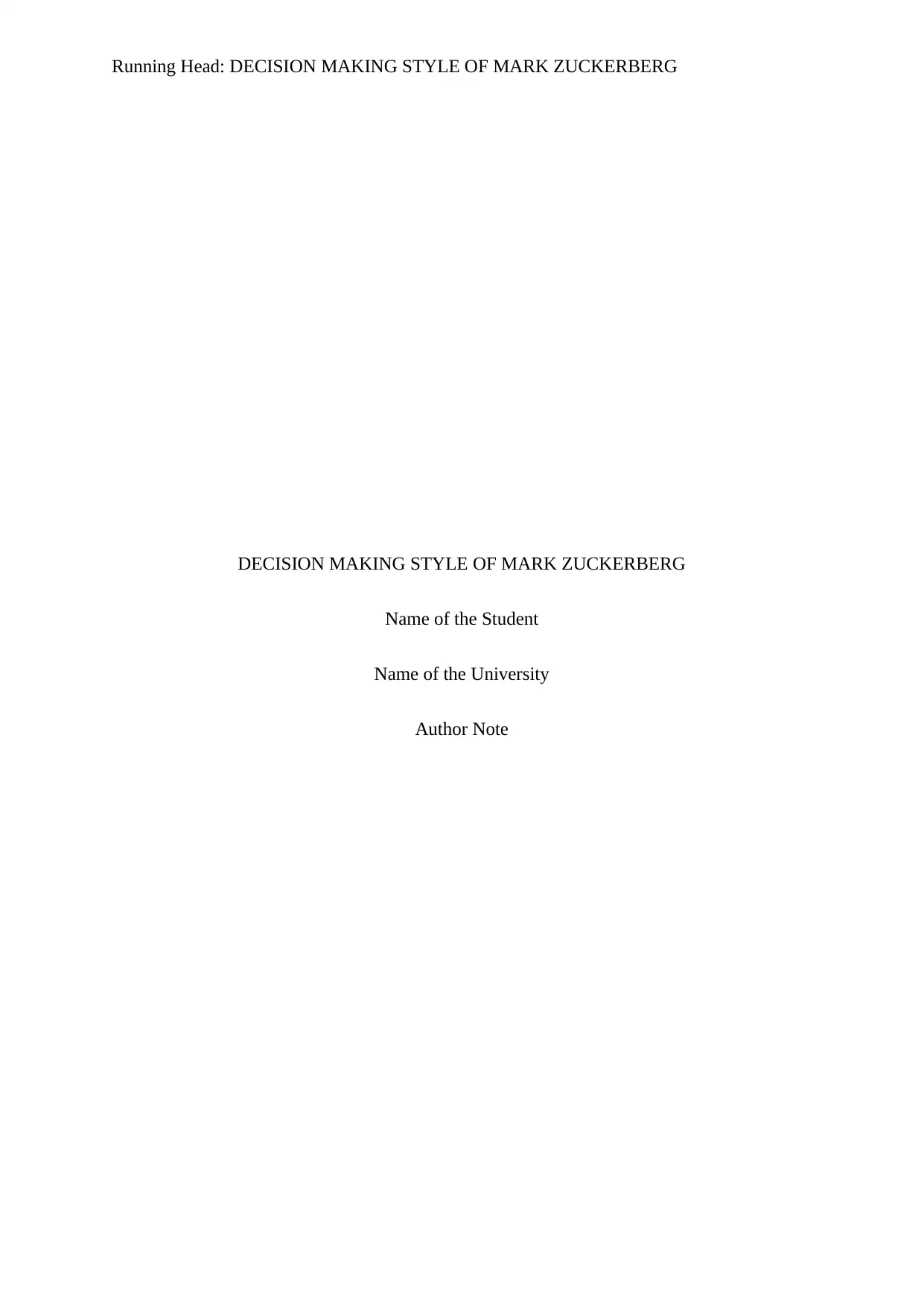
Running Head: DECISION MAKING STYLE OF MARK ZUCKERBERG
DECISION MAKING STYLE OF MARK ZUCKERBERG
Name of the Student
Name of the University
Author Note
DECISION MAKING STYLE OF MARK ZUCKERBERG
Name of the Student
Name of the University
Author Note
Paraphrase This Document
Need a fresh take? Get an instant paraphrase of this document with our AI Paraphraser
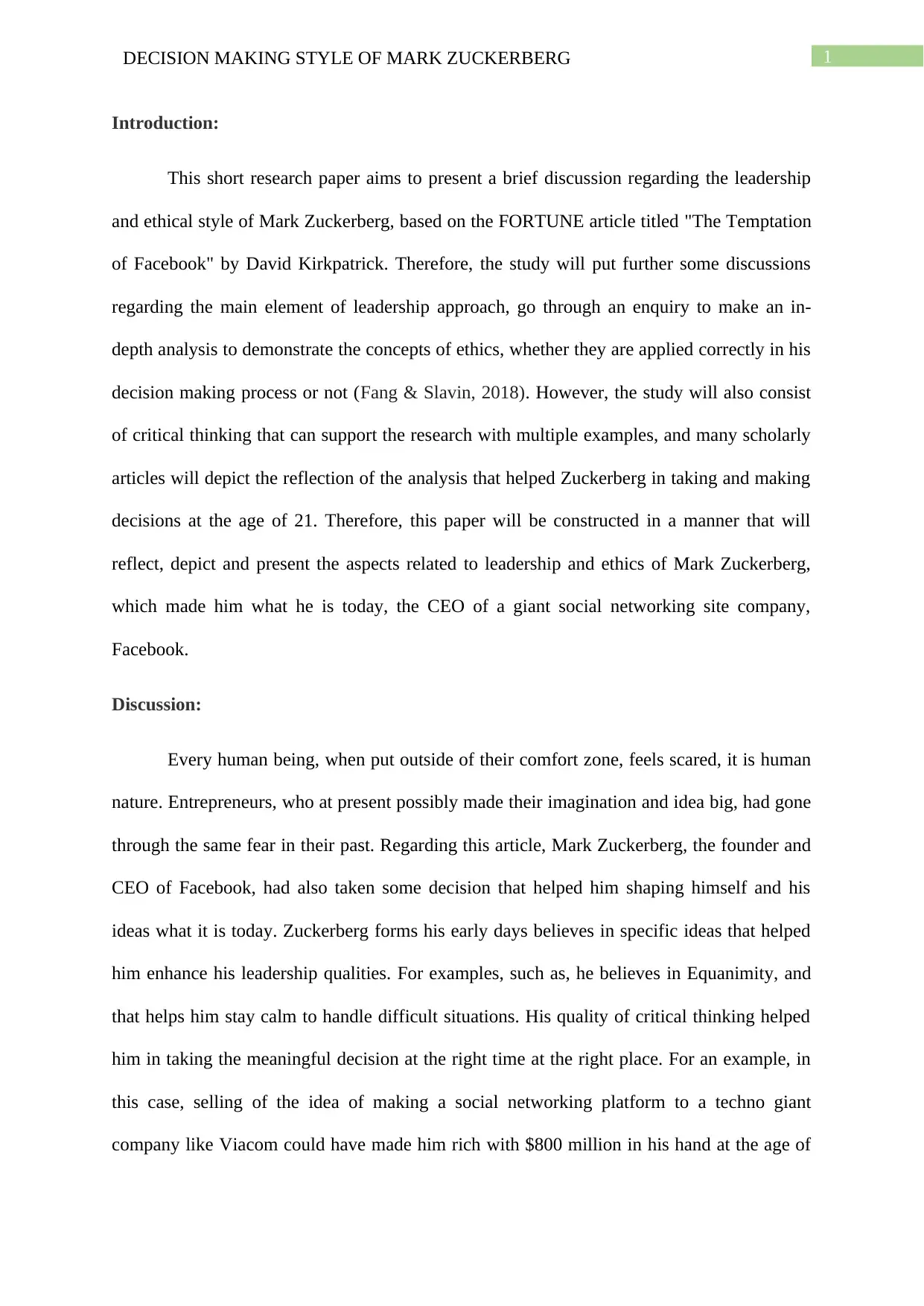
1DECISION MAKING STYLE OF MARK ZUCKERBERG
Introduction:
This short research paper aims to present a brief discussion regarding the leadership
and ethical style of Mark Zuckerberg, based on the FORTUNE article titled "The Temptation
of Facebook" by David Kirkpatrick. Therefore, the study will put further some discussions
regarding the main element of leadership approach, go through an enquiry to make an in-
depth analysis to demonstrate the concepts of ethics, whether they are applied correctly in his
decision making process or not (Fang & Slavin, 2018). However, the study will also consist
of critical thinking that can support the research with multiple examples, and many scholarly
articles will depict the reflection of the analysis that helped Zuckerberg in taking and making
decisions at the age of 21. Therefore, this paper will be constructed in a manner that will
reflect, depict and present the aspects related to leadership and ethics of Mark Zuckerberg,
which made him what he is today, the CEO of a giant social networking site company,
Facebook.
Discussion:
Every human being, when put outside of their comfort zone, feels scared, it is human
nature. Entrepreneurs, who at present possibly made their imagination and idea big, had gone
through the same fear in their past. Regarding this article, Mark Zuckerberg, the founder and
CEO of Facebook, had also taken some decision that helped him shaping himself and his
ideas what it is today. Zuckerberg forms his early days believes in specific ideas that helped
him enhance his leadership qualities. For examples, such as, he believes in Equanimity, and
that helps him stay calm to handle difficult situations. His quality of critical thinking helped
him in taking the meaningful decision at the right time at the right place. For an example, in
this case, selling of the idea of making a social networking platform to a techno giant
company like Viacom could have made him rich with $800 million in his hand at the age of
Introduction:
This short research paper aims to present a brief discussion regarding the leadership
and ethical style of Mark Zuckerberg, based on the FORTUNE article titled "The Temptation
of Facebook" by David Kirkpatrick. Therefore, the study will put further some discussions
regarding the main element of leadership approach, go through an enquiry to make an in-
depth analysis to demonstrate the concepts of ethics, whether they are applied correctly in his
decision making process or not (Fang & Slavin, 2018). However, the study will also consist
of critical thinking that can support the research with multiple examples, and many scholarly
articles will depict the reflection of the analysis that helped Zuckerberg in taking and making
decisions at the age of 21. Therefore, this paper will be constructed in a manner that will
reflect, depict and present the aspects related to leadership and ethics of Mark Zuckerberg,
which made him what he is today, the CEO of a giant social networking site company,
Facebook.
Discussion:
Every human being, when put outside of their comfort zone, feels scared, it is human
nature. Entrepreneurs, who at present possibly made their imagination and idea big, had gone
through the same fear in their past. Regarding this article, Mark Zuckerberg, the founder and
CEO of Facebook, had also taken some decision that helped him shaping himself and his
ideas what it is today. Zuckerberg forms his early days believes in specific ideas that helped
him enhance his leadership qualities. For examples, such as, he believes in Equanimity, and
that helps him stay calm to handle difficult situations. His quality of critical thinking helped
him in taking the meaningful decision at the right time at the right place. For an example, in
this case, selling of the idea of making a social networking platform to a techno giant
company like Viacom could have made him rich with $800 million in his hand at the age of
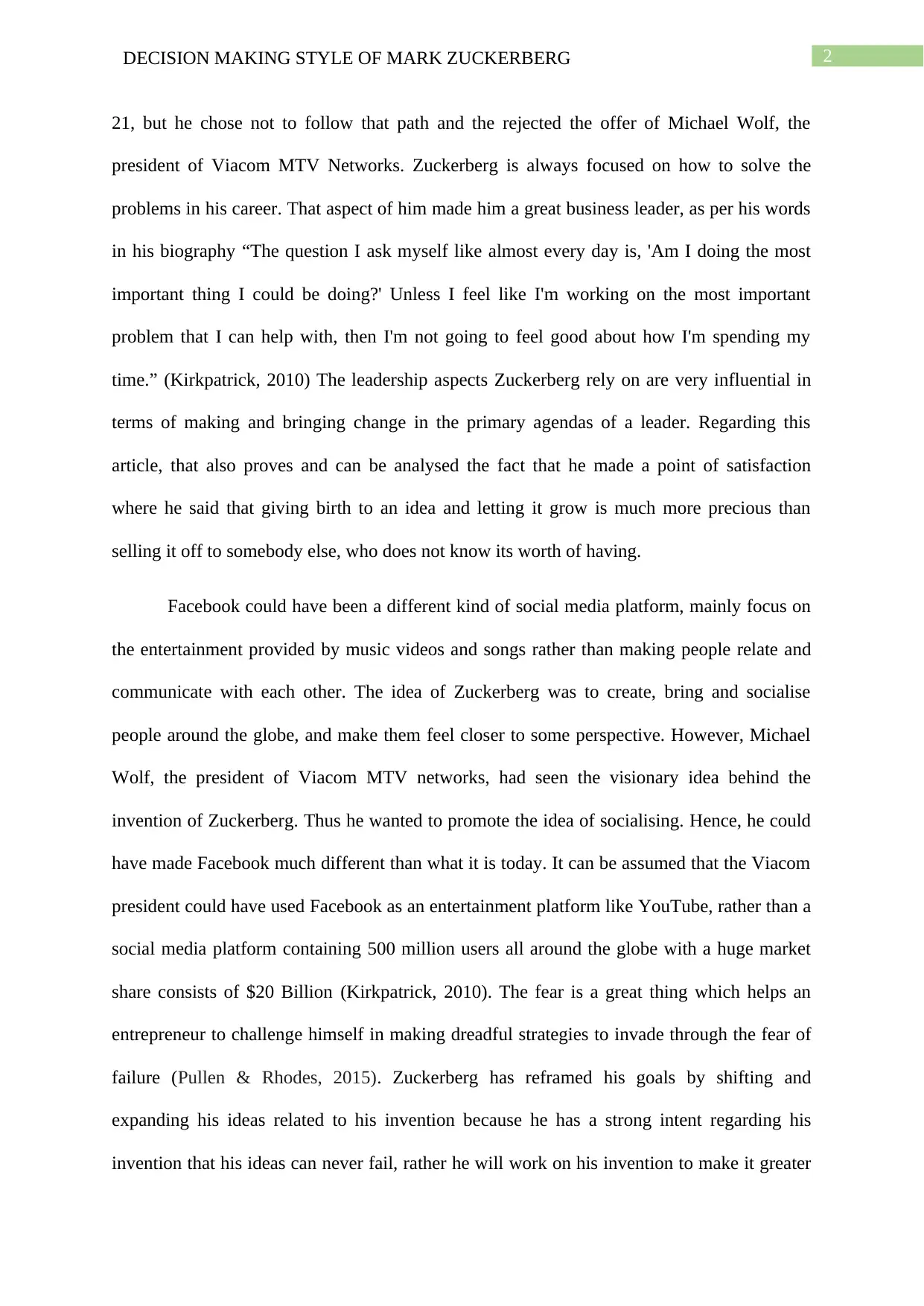
2DECISION MAKING STYLE OF MARK ZUCKERBERG
21, but he chose not to follow that path and the rejected the offer of Michael Wolf, the
president of Viacom MTV Networks. Zuckerberg is always focused on how to solve the
problems in his career. That aspect of him made him a great business leader, as per his words
in his biography “The question I ask myself like almost every day is, 'Am I doing the most
important thing I could be doing?' Unless I feel like I'm working on the most important
problem that I can help with, then I'm not going to feel good about how I'm spending my
time.” (Kirkpatrick, 2010) The leadership aspects Zuckerberg rely on are very influential in
terms of making and bringing change in the primary agendas of a leader. Regarding this
article, that also proves and can be analysed the fact that he made a point of satisfaction
where he said that giving birth to an idea and letting it grow is much more precious than
selling it off to somebody else, who does not know its worth of having.
Facebook could have been a different kind of social media platform, mainly focus on
the entertainment provided by music videos and songs rather than making people relate and
communicate with each other. The idea of Zuckerberg was to create, bring and socialise
people around the globe, and make them feel closer to some perspective. However, Michael
Wolf, the president of Viacom MTV networks, had seen the visionary idea behind the
invention of Zuckerberg. Thus he wanted to promote the idea of socialising. Hence, he could
have made Facebook much different than what it is today. It can be assumed that the Viacom
president could have used Facebook as an entertainment platform like YouTube, rather than a
social media platform containing 500 million users all around the globe with a huge market
share consists of $20 Billion (Kirkpatrick, 2010). The fear is a great thing which helps an
entrepreneur to challenge himself in making dreadful strategies to invade through the fear of
failure (Pullen & Rhodes, 2015). Zuckerberg has reframed his goals by shifting and
expanding his ideas related to his invention because he has a strong intent regarding his
invention that his ideas can never fail, rather he will work on his invention to make it greater
21, but he chose not to follow that path and the rejected the offer of Michael Wolf, the
president of Viacom MTV Networks. Zuckerberg is always focused on how to solve the
problems in his career. That aspect of him made him a great business leader, as per his words
in his biography “The question I ask myself like almost every day is, 'Am I doing the most
important thing I could be doing?' Unless I feel like I'm working on the most important
problem that I can help with, then I'm not going to feel good about how I'm spending my
time.” (Kirkpatrick, 2010) The leadership aspects Zuckerberg rely on are very influential in
terms of making and bringing change in the primary agendas of a leader. Regarding this
article, that also proves and can be analysed the fact that he made a point of satisfaction
where he said that giving birth to an idea and letting it grow is much more precious than
selling it off to somebody else, who does not know its worth of having.
Facebook could have been a different kind of social media platform, mainly focus on
the entertainment provided by music videos and songs rather than making people relate and
communicate with each other. The idea of Zuckerberg was to create, bring and socialise
people around the globe, and make them feel closer to some perspective. However, Michael
Wolf, the president of Viacom MTV networks, had seen the visionary idea behind the
invention of Zuckerberg. Thus he wanted to promote the idea of socialising. Hence, he could
have made Facebook much different than what it is today. It can be assumed that the Viacom
president could have used Facebook as an entertainment platform like YouTube, rather than a
social media platform containing 500 million users all around the globe with a huge market
share consists of $20 Billion (Kirkpatrick, 2010). The fear is a great thing which helps an
entrepreneur to challenge himself in making dreadful strategies to invade through the fear of
failure (Pullen & Rhodes, 2015). Zuckerberg has reframed his goals by shifting and
expanding his ideas related to his invention because he has a strong intent regarding his
invention that his ideas can never fail, rather he will work on his invention to make it greater
⊘ This is a preview!⊘
Do you want full access?
Subscribe today to unlock all pages.

Trusted by 1+ million students worldwide
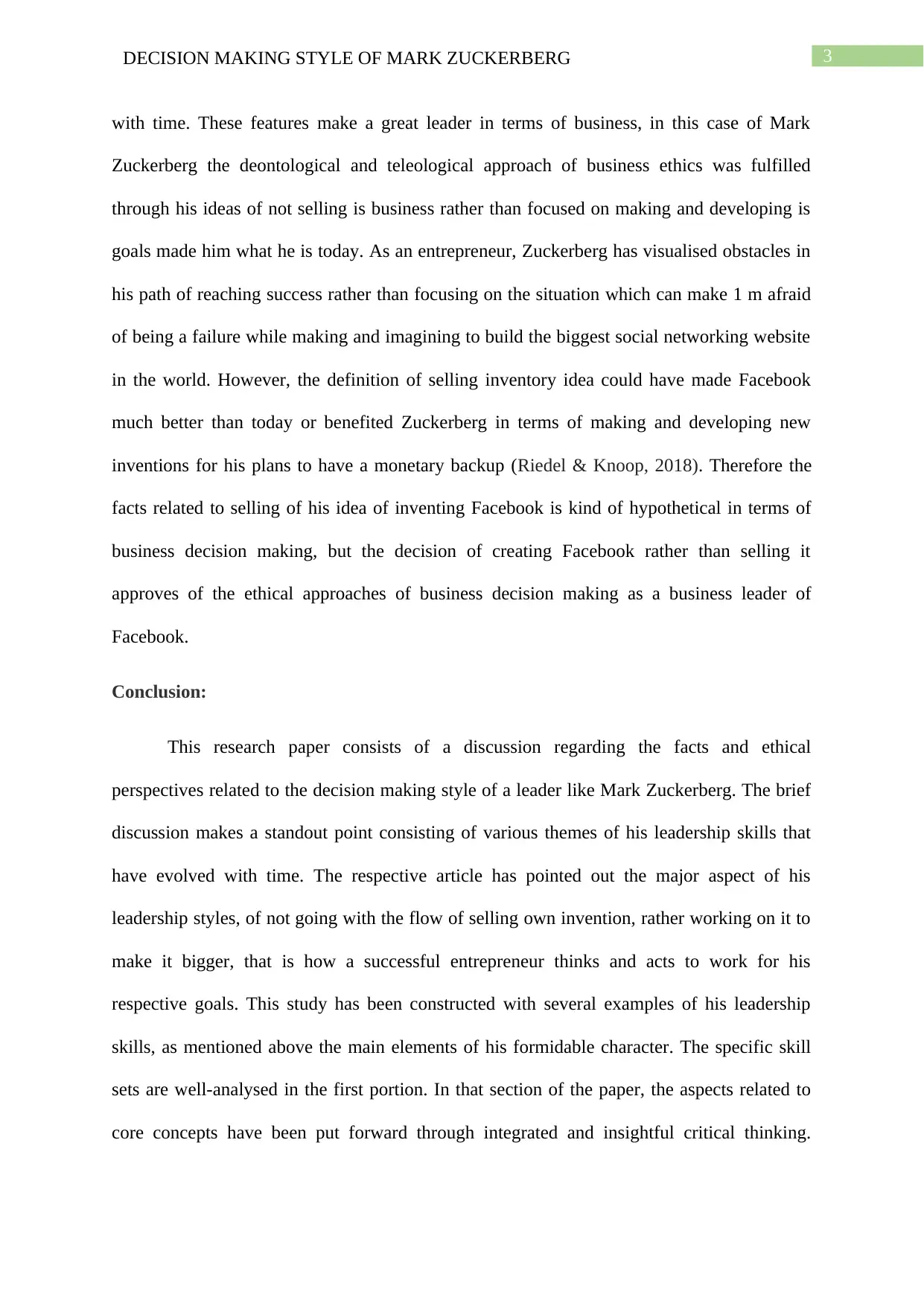
3DECISION MAKING STYLE OF MARK ZUCKERBERG
with time. These features make a great leader in terms of business, in this case of Mark
Zuckerberg the deontological and teleological approach of business ethics was fulfilled
through his ideas of not selling is business rather than focused on making and developing is
goals made him what he is today. As an entrepreneur, Zuckerberg has visualised obstacles in
his path of reaching success rather than focusing on the situation which can make 1 m afraid
of being a failure while making and imagining to build the biggest social networking website
in the world. However, the definition of selling inventory idea could have made Facebook
much better than today or benefited Zuckerberg in terms of making and developing new
inventions for his plans to have a monetary backup (Riedel & Knoop, 2018). Therefore the
facts related to selling of his idea of inventing Facebook is kind of hypothetical in terms of
business decision making, but the decision of creating Facebook rather than selling it
approves of the ethical approaches of business decision making as a business leader of
Facebook.
Conclusion:
This research paper consists of a discussion regarding the facts and ethical
perspectives related to the decision making style of a leader like Mark Zuckerberg. The brief
discussion makes a standout point consisting of various themes of his leadership skills that
have evolved with time. The respective article has pointed out the major aspect of his
leadership styles, of not going with the flow of selling own invention, rather working on it to
make it bigger, that is how a successful entrepreneur thinks and acts to work for his
respective goals. This study has been constructed with several examples of his leadership
skills, as mentioned above the main elements of his formidable character. The specific skill
sets are well-analysed in the first portion. In that section of the paper, the aspects related to
core concepts have been put forward through integrated and insightful critical thinking.
with time. These features make a great leader in terms of business, in this case of Mark
Zuckerberg the deontological and teleological approach of business ethics was fulfilled
through his ideas of not selling is business rather than focused on making and developing is
goals made him what he is today. As an entrepreneur, Zuckerberg has visualised obstacles in
his path of reaching success rather than focusing on the situation which can make 1 m afraid
of being a failure while making and imagining to build the biggest social networking website
in the world. However, the definition of selling inventory idea could have made Facebook
much better than today or benefited Zuckerberg in terms of making and developing new
inventions for his plans to have a monetary backup (Riedel & Knoop, 2018). Therefore the
facts related to selling of his idea of inventing Facebook is kind of hypothetical in terms of
business decision making, but the decision of creating Facebook rather than selling it
approves of the ethical approaches of business decision making as a business leader of
Facebook.
Conclusion:
This research paper consists of a discussion regarding the facts and ethical
perspectives related to the decision making style of a leader like Mark Zuckerberg. The brief
discussion makes a standout point consisting of various themes of his leadership skills that
have evolved with time. The respective article has pointed out the major aspect of his
leadership styles, of not going with the flow of selling own invention, rather working on it to
make it bigger, that is how a successful entrepreneur thinks and acts to work for his
respective goals. This study has been constructed with several examples of his leadership
skills, as mentioned above the main elements of his formidable character. The specific skill
sets are well-analysed in the first portion. In that section of the paper, the aspects related to
core concepts have been put forward through integrated and insightful critical thinking.
Paraphrase This Document
Need a fresh take? Get an instant paraphrase of this document with our AI Paraphraser

4DECISION MAKING STYLE OF MARK ZUCKERBERG
Lastly, the second portion of the analysis goes through making a well-researched study
regarding the fact that what could have happened if he sold his invention to Michael Wolf.
Lastly, the second portion of the analysis goes through making a well-researched study
regarding the fact that what could have happened if he sold his invention to Michael Wolf.
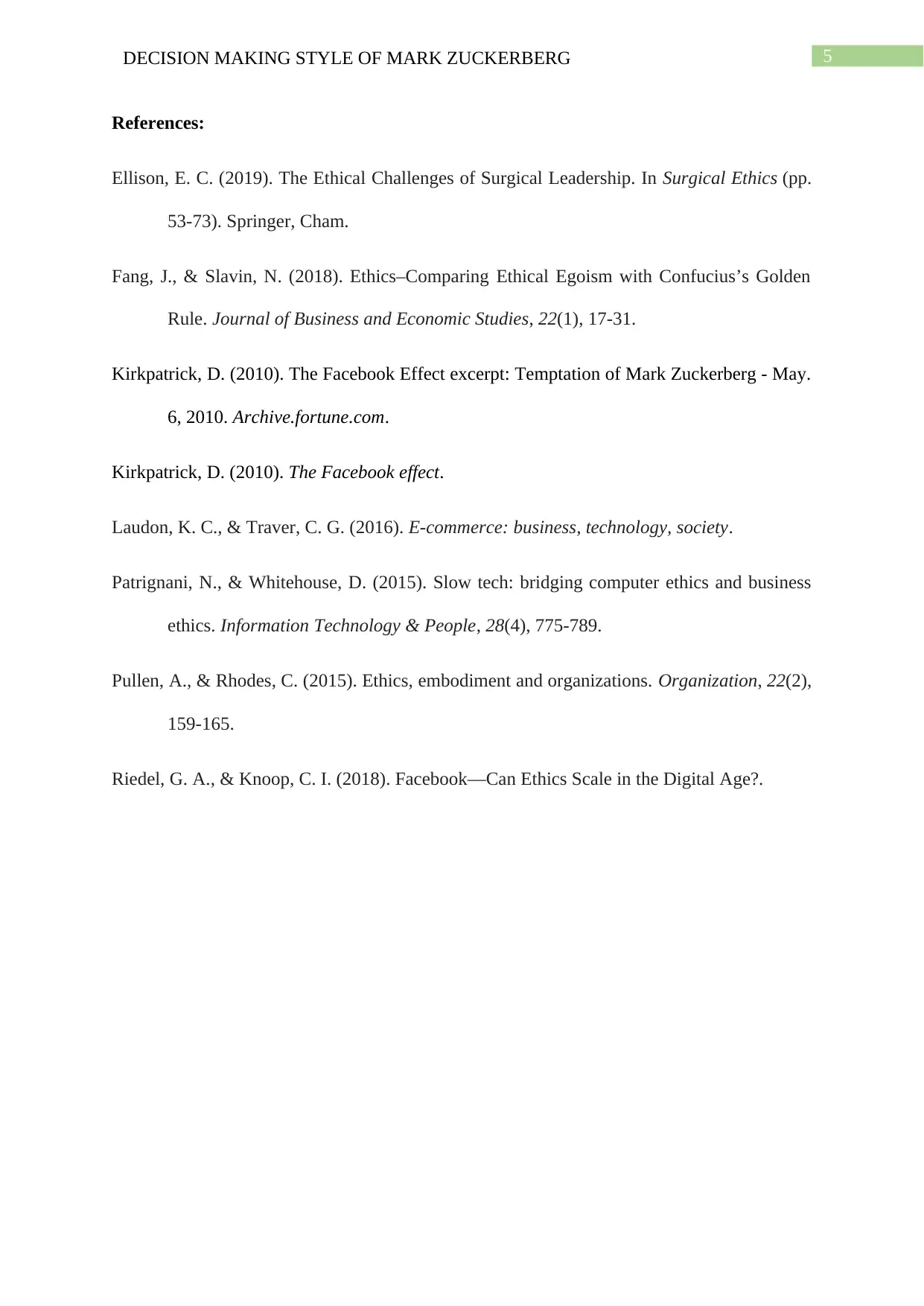
5DECISION MAKING STYLE OF MARK ZUCKERBERG
References:
Ellison, E. C. (2019). The Ethical Challenges of Surgical Leadership. In Surgical Ethics (pp.
53-73). Springer, Cham.
Fang, J., & Slavin, N. (2018). Ethics–Comparing Ethical Egoism with Confucius’s Golden
Rule. Journal of Business and Economic Studies, 22(1), 17-31.
Kirkpatrick, D. (2010). The Facebook Effect excerpt: Temptation of Mark Zuckerberg - May.
6, 2010. Archive.fortune.com.
Kirkpatrick, D. (2010). The Facebook effect.
Laudon, K. C., & Traver, C. G. (2016). E-commerce: business, technology, society.
Patrignani, N., & Whitehouse, D. (2015). Slow tech: bridging computer ethics and business
ethics. Information Technology & People, 28(4), 775-789.
Pullen, A., & Rhodes, C. (2015). Ethics, embodiment and organizations. Organization, 22(2),
159-165.
Riedel, G. A., & Knoop, C. I. (2018). Facebook—Can Ethics Scale in the Digital Age?.
References:
Ellison, E. C. (2019). The Ethical Challenges of Surgical Leadership. In Surgical Ethics (pp.
53-73). Springer, Cham.
Fang, J., & Slavin, N. (2018). Ethics–Comparing Ethical Egoism with Confucius’s Golden
Rule. Journal of Business and Economic Studies, 22(1), 17-31.
Kirkpatrick, D. (2010). The Facebook Effect excerpt: Temptation of Mark Zuckerberg - May.
6, 2010. Archive.fortune.com.
Kirkpatrick, D. (2010). The Facebook effect.
Laudon, K. C., & Traver, C. G. (2016). E-commerce: business, technology, society.
Patrignani, N., & Whitehouse, D. (2015). Slow tech: bridging computer ethics and business
ethics. Information Technology & People, 28(4), 775-789.
Pullen, A., & Rhodes, C. (2015). Ethics, embodiment and organizations. Organization, 22(2),
159-165.
Riedel, G. A., & Knoop, C. I. (2018). Facebook—Can Ethics Scale in the Digital Age?.
⊘ This is a preview!⊘
Do you want full access?
Subscribe today to unlock all pages.

Trusted by 1+ million students worldwide
1 out of 6
Related Documents
Your All-in-One AI-Powered Toolkit for Academic Success.
+13062052269
info@desklib.com
Available 24*7 on WhatsApp / Email
![[object Object]](/_next/static/media/star-bottom.7253800d.svg)
Unlock your academic potential
Copyright © 2020–2026 A2Z Services. All Rights Reserved. Developed and managed by ZUCOL.





